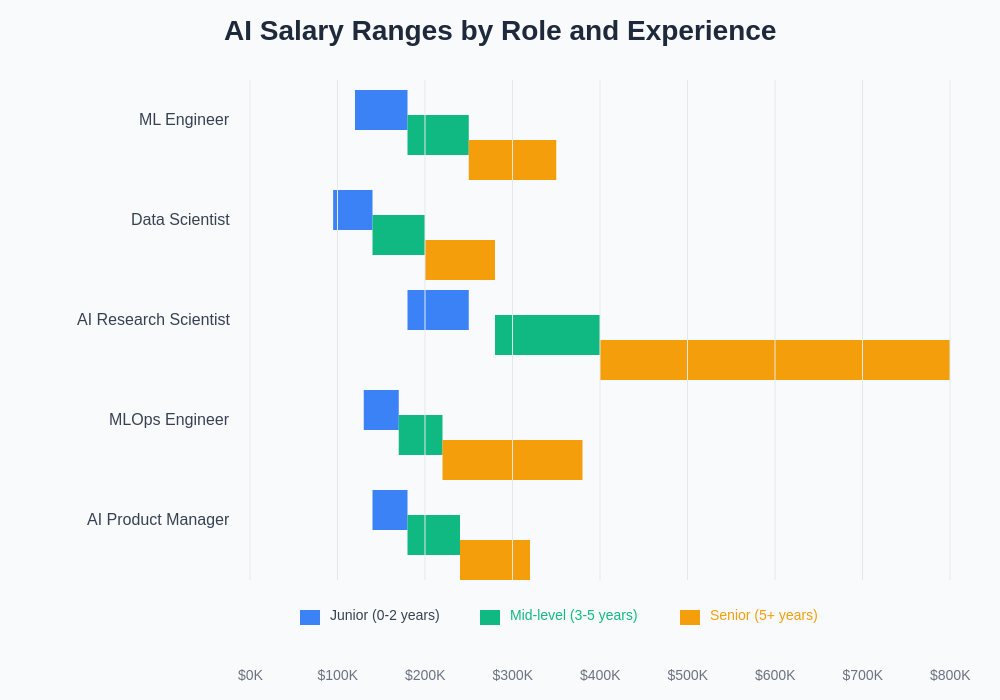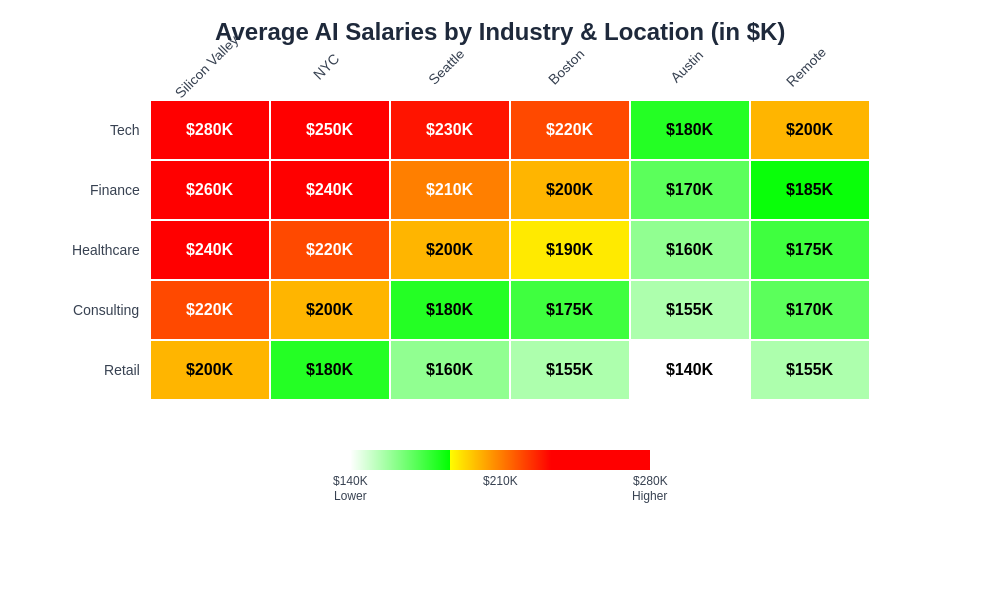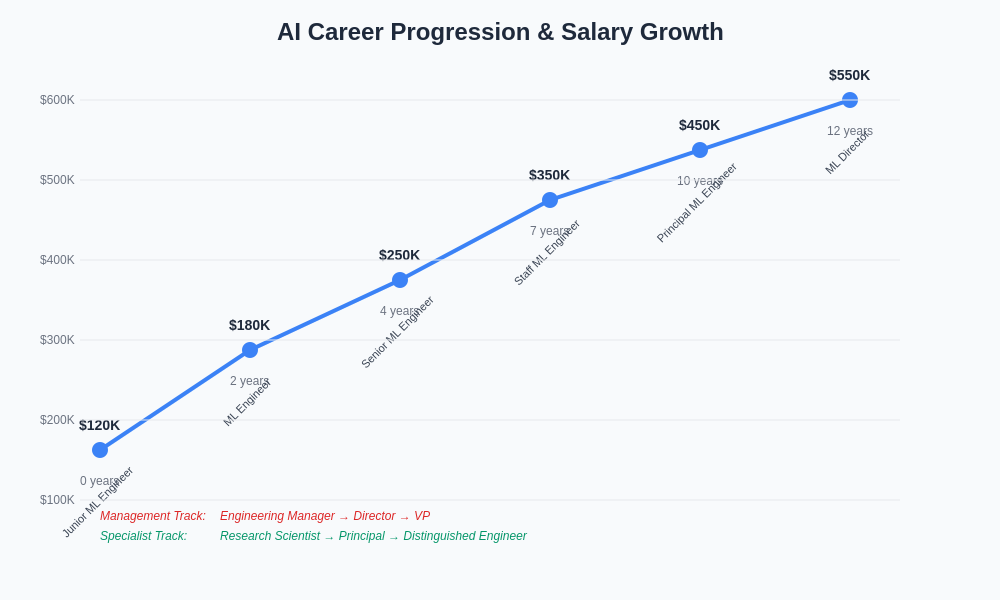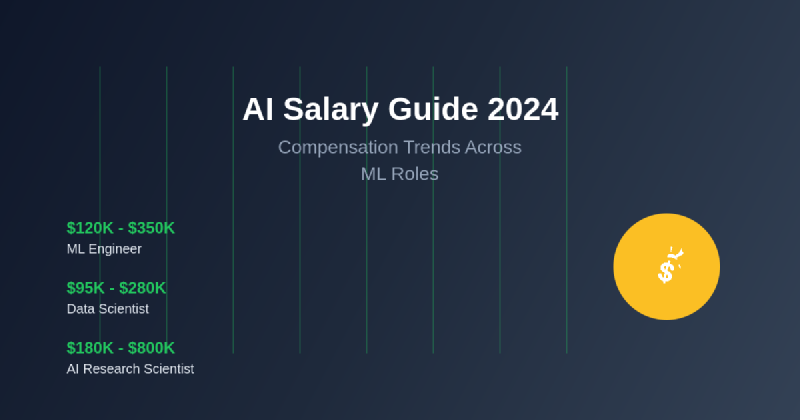The artificial intelligence and machine learning landscape has experienced unprecedented growth over the past decade, fundamentally transforming not only how businesses operate but also creating an entirely new ecosystem of high-paying career opportunities. As organizations across industries recognize the transformative power of AI technologies, the demand for skilled professionals in this field has skyrocketed, leading to some of the most lucrative compensation packages in the technology sector.
Stay updated with the latest AI career trends and opportunities to understand how the rapidly evolving field continues to create new pathways for professional growth and financial success. The intersection of technological advancement and market demand has created a unique environment where AI professionals command premium salaries that reflect both the scarcity of qualified talent and the immense value these skills bring to organizations seeking competitive advantage in an increasingly data-driven world.
The Current State of AI Compensation
The artificial intelligence job market has matured into a sophisticated ecosystem where compensation levels vary significantly based on role specialization, geographic location, company size, and individual expertise. Unlike traditional technology roles that follow relatively predictable salary progressions, AI positions often command premium compensation packages that reflect the specialized nature of the work and the direct impact these roles have on business outcomes and innovation initiatives.
Current market analysis reveals that entry-level AI positions typically start at compensation levels that exceed senior-level roles in many other technology domains, while experienced AI professionals often receive total compensation packages that rival those of executive positions in traditional industries. This premium reflects not only the technical complexity of the work but also the strategic importance of AI initiatives in driving business transformation and competitive differentiation.
The compensation landscape is further complicated by the rapid evolution of AI technologies, which creates ongoing demand for professionals who can adapt to emerging frameworks, methodologies, and applications. Organizations are increasingly willing to pay premium rates for professionals who demonstrate not only current technical competence but also the ability to evolve with the rapidly changing technological landscape.
Machine Learning Engineer Compensation Trends
Machine Learning Engineers represent one of the most sought-after roles in the AI ecosystem, commanding impressive compensation packages that reflect their critical role in translating theoretical AI concepts into practical, scalable solutions. These professionals typically earn base salaries ranging from $120,000 to $180,000 for entry-level positions, with experienced engineers commanding base salaries between $200,000 and $350,000 annually, before considering equity compensation and performance bonuses.
The total compensation picture for Machine Learning Engineers becomes even more compelling when considering the comprehensive nature of their compensation packages. Top-tier technology companies often provide equity grants that can double or triple the effective annual compensation, particularly in high-growth organizations where stock appreciation significantly enhances the total financial package. Additionally, many organizations offer substantial signing bonuses, ranging from $25,000 to $100,000, to attract top talent in this competitive market.
Geographic location plays a crucial role in determining ML Engineer compensation, with Silicon Valley, Seattle, New York, and Boston commanding the highest salary levels due to both the concentration of leading AI companies and the higher cost of living in these markets. However, the rise of remote work has begun to democratize access to these high-compensation opportunities, allowing skilled professionals in lower-cost markets to access premium salary levels while maintaining more favorable cost-of-living ratios.
Explore advanced AI development tools and platforms that are shaping the future of machine learning engineering and creating new opportunities for career advancement and specialization. The continuous evolution of ML engineering tools and methodologies ensures that professionals who stay current with emerging technologies continue to command premium compensation throughout their careers.
Data Scientist Salary Evolution
Data Scientists have experienced significant compensation growth as organizations recognize the strategic value of data-driven decision making and predictive analytics. Entry-level Data Scientist positions typically offer starting salaries between $95,000 and $140,000, while senior-level professionals can expect compensation ranging from $160,000 to $280,000, with principal and staff-level positions reaching $300,000 or more in total annual compensation.
The role of Data Scientist has evolved considerably from its early incarnation as primarily a statistical analysis function to encompass sophisticated machine learning model development, business strategy consulting, and cross-functional leadership responsibilities. This evolution has been accompanied by corresponding increases in compensation expectations, as organizations recognize that effective Data Scientists provide strategic value that extends far beyond technical analysis capabilities.
Specialization within the Data Science field has created additional compensation premiums for professionals with expertise in specific domains such as natural language processing, computer vision, recommendation systems, and autonomous systems. These specialized roles often command 20-40% compensation premiums over generalist Data Science positions, reflecting both the additional technical complexity and the direct business impact of these specialized applications.
The compensation trajectory for Data Scientists is particularly attractive because the role serves as a natural progression path toward senior leadership positions in product management, strategic consulting, and executive roles. Many Data Scientists leverage their analytical skills and business acumen to transition into higher-compensation leadership roles where their technical background provides significant strategic advantage.
AI Research Scientist Compensation
AI Research Scientists occupy a unique position in the compensation landscape, often commanding some of the highest salaries in the technology industry due to their specialized expertise in advancing the fundamental capabilities of artificial intelligence systems. These roles typically require advanced degrees and demonstrated research contributions, with compensation packages that reflect both the scarcity of qualified candidates and the strategic importance of research and development initiatives.
Entry-level AI Research Scientist positions at leading technology companies and research institutions typically offer starting compensation between $180,000 and $250,000, while senior research scientists can command total compensation packages ranging from $400,000 to $800,000 or more, particularly at organizations where research directly contributes to product development and revenue generation.
The compensation structure for AI Research Scientists often includes significant equity components and research-related bonuses that can substantially increase total annual compensation. Many organizations also provide additional benefits such as conference attendance funding, publication bonuses, and patent incentive payments that recognize the intellectual property contributions these professionals make to their organizations.

The career progression opportunities for AI Research Scientists are particularly compelling because these roles often lead to distinguished positions such as Principal Scientist, Research Director, or Chief Technology Officer roles that combine technical leadership with strategic business responsibility. The compensation growth trajectory for research scientists often accelerates significantly as they demonstrate the ability to translate research insights into practical applications that drive business value.
MLOps and AI Infrastructure Specialists
The emergence of MLOps as a distinct discipline has created a new category of high-compensation roles focused on the operationalization and scaling of machine learning systems. MLOps Engineers and AI Infrastructure Specialists typically earn base salaries ranging from $130,000 to $200,000 for mid-level positions, with senior specialists commanding compensation packages between $220,000 and $380,000 annually.
These roles have become increasingly critical as organizations move beyond proof-of-concept AI projects toward production-scale deployments that require sophisticated infrastructure, monitoring, and governance capabilities. The specialized nature of MLOps work, which combines deep technical knowledge of machine learning systems with enterprise-scale infrastructure expertise, has created strong demand for professionals who can effectively bridge these domains.
The compensation premium for MLOps specialists reflects both the technical complexity of the work and the business-critical nature of these roles in ensuring reliable, scalable AI system operation. Organizations recognize that ineffective MLOps capabilities can undermine the value of significant AI investments, leading to strong incentives to attract and retain top talent in this specialized field.
Career progression opportunities in MLOps often lead toward senior technical leadership roles such as Principal Engineer, Engineering Manager, or Platform Architecture positions that combine deep technical expertise with strategic responsibility for organizational AI capabilities. The interdisciplinary nature of MLOps work also creates opportunities for professionals to develop broad technical and business skills that support diverse career advancement paths.
Discover comprehensive AI research tools and platforms that are essential for staying current with rapidly evolving best practices in MLOps and AI infrastructure management. The continuous evolution of MLOps tools and methodologies ensures that professionals who maintain current expertise continue to command premium compensation throughout their careers.
Geographic Compensation Variations
Geographic location remains one of the most significant factors influencing AI compensation levels, with major technology hubs commanding substantial premiums over other markets due to both competitive dynamics and cost-of-living considerations. Silicon Valley continues to offer the highest AI compensation levels, with senior roles often exceeding national averages by 40-60%, followed closely by Seattle, New York, Boston, and other major metropolitan areas with significant technology industry presence.
The geographic compensation landscape has become more complex with the widespread adoption of remote work policies, which have enabled many professionals to access high-compensation opportunities while living in lower-cost markets. However, many organizations have implemented location-based salary adjustments that partially offset this advantage, though remote workers often still achieve better effective compensation when considering cost-of-living differences.
International markets present additional complexity in AI compensation analysis, with countries such as Canada, the United Kingdom, Germany, and Australia offering competitive AI salaries that often provide attractive lifestyle and career opportunities when considering factors such as healthcare, education, and quality of life. Many international opportunities also provide pathways to eventual relocation to higher-compensation markets for professionals seeking to maximize long-term earning potential.
The emergence of specialized AI hubs in cities such as Austin, Denver, Atlanta, and Research Triangle Park has created new opportunities for professionals to access competitive compensation while benefiting from more favorable cost-of-living ratios and growing technology ecosystems. These markets often provide excellent career development opportunities with slightly lower absolute compensation but significantly better lifestyle and financial outcomes when considering total economic factors.
Industry-Specific Compensation Patterns
Different industries exhibit distinct compensation patterns for AI professionals based on factors such as revenue models, regulatory requirements, competitive dynamics, and the strategic importance of AI initiatives within each sector. Technology companies typically offer the highest overall compensation packages, often including substantial equity components that can significantly amplify total compensation over time.
Financial services organizations have emerged as aggressive competitors for AI talent, often matching or exceeding technology company compensation levels due to the direct revenue impact of AI applications in trading, risk management, fraud detection, and customer experience optimization. Healthcare and pharmaceutical companies also command premium compensation for AI professionals due to the specialized domain knowledge required and the high-stakes nature of healthcare applications.
Traditional industries such as manufacturing, retail, and energy are increasingly investing in AI capabilities and offering competitive compensation packages to attract talent, though these opportunities often provide different value propositions such as greater autonomy, diverse project exposure, and opportunities to drive significant organizational transformation in industries that are earlier in their AI adoption journey.
Consulting organizations and specialized AI service providers offer unique compensation structures that often include performance-based bonuses, client engagement incentives, and accelerated promotion opportunities that can result in rapid compensation growth for high-performing professionals who effectively combine technical expertise with client relationship management capabilities.

The startup ecosystem presents particularly interesting compensation dynamics, where lower base salaries are often offset by significant equity opportunities that can result in substantial financial outcomes for professionals who join high-growth companies during early-stage phases. The risk-reward profile of startup compensation requires careful evaluation of company prospects, market opportunity, and personal financial circumstances.
Factors Influencing AI Compensation
Multiple factors contribute to the significant variation in AI compensation levels, with educational background serving as a foundational element that influences both initial compensation levels and long-term career trajectory opportunities. Advanced degrees from prestigious institutions continue to command compensation premiums, particularly for research-oriented roles, though the rapid evolution of the field has also created opportunities for self-taught professionals who demonstrate exceptional practical skills.
Technical specialization within AI domains significantly impacts compensation potential, with expertise in areas such as natural language processing, computer vision, reinforcement learning, and autonomous systems often commanding premium rates due to the specialized knowledge required and the direct business applications of these capabilities. Professionals who develop deep expertise in multiple AI domains often achieve the highest compensation levels due to their versatility and strategic value to organizations.
Industry experience and domain expertise create additional compensation premiums for professionals who combine AI technical skills with deep understanding of specific business contexts such as healthcare, finance, autonomous vehicles, or e-commerce. This combination of technical and domain expertise is particularly valuable because it enables more effective AI solution development and implementation within complex organizational contexts.
Leadership and management capabilities significantly influence compensation growth potential, with AI professionals who develop effective team leadership, project management, and strategic communication skills often achieving accelerated career progression and compensation growth. The ability to effectively translate technical concepts for non-technical stakeholders is particularly valuable and often distinguishes high-compensation professionals from their purely technical counterparts.
Publication history, conference presentations, open-source contributions, and other forms of professional visibility can significantly impact compensation opportunities by demonstrating expertise and thought leadership within the AI community. These activities often lead to enhanced career opportunities, speaking engagements, consulting opportunities, and recognition that supports premium compensation negotiations.
Career Progression and Compensation Growth
The AI field offers exceptional career progression opportunities with corresponding compensation growth potential that often exceeds traditional technology career paths. Entry-level professionals who demonstrate consistent performance and continuous learning often achieve 15-25% annual compensation growth during their first several years, with particularly strong performers sometimes achieving even higher growth rates through promotions and role expansions.
Mid-career AI professionals typically face decision points between individual contributor excellence and management track progression, with both paths offering substantial compensation growth potential. Senior individual contributors can achieve compensation levels comparable to or exceeding management roles by developing deep technical expertise and taking responsibility for high-impact projects that directly contribute to organizational success.
Management track progression in AI organizations often leads to roles such as AI Team Lead, Data Science Manager, ML Engineering Manager, and eventually Director or VP-level positions with total compensation packages that can exceed $500,000 annually at major technology companies. These roles require the development of complementary skills in people management, strategic planning, and business development alongside maintaining current technical knowledge.
The entrepreneurial path presents unique compensation opportunities for AI professionals who develop innovative solutions or found successful companies, though this path involves significantly higher risk and typically requires substantial personal and professional investment before achieving financial returns. Many successful AI entrepreneurs leverage their technical expertise and industry networks to create high-value solutions that address specific market needs.

Consulting and advisory opportunities provide additional income streams for experienced AI professionals who can leverage their expertise to help multiple organizations develop AI strategies and implement solutions. These opportunities often provide both immediate financial benefits and long-term career development advantages through exposure to diverse industry challenges and business contexts.
Benefits and Total Compensation Packages
AI compensation packages typically extend far beyond base salary to include comprehensive benefits that significantly enhance total economic value. Equity compensation represents a major component of AI professional compensation at technology companies, with grants often representing 25-50% of total annual compensation value and providing substantial upside potential in high-growth organizations.
Health and wellness benefits for AI professionals often include premium healthcare coverage, mental health support, fitness and wellness stipends, and comprehensive family support services that recognize the demanding nature of AI work and the importance of maintaining work-life balance. Many organizations also provide substantial professional development budgets that support conference attendance, training programs, and continuing education initiatives.
Technology and equipment allowances are standard for AI roles due to the computational requirements of the work, with many organizations providing high-end laptops, cloud computing credits, and access to specialized software and datasets. Some organizations also provide home office setup allowances and ergonomic equipment to support effective remote work arrangements.
Flexible work arrangements have become increasingly important components of AI compensation packages, with many organizations offering unlimited vacation policies, sabbatical opportunities, and flexible scheduling arrangements that recognize the project-based nature of much AI work and the global collaboration requirements of many teams.
Stock purchase plans, 401(k) matching, and other financial benefits often provide additional value that can significantly enhance long-term financial outcomes for AI professionals who take advantage of these programs and maintain disciplined approaches to wealth building and financial planning.
Future Compensation Trends and Predictions
The AI compensation landscape continues to evolve rapidly as the field matures and new application areas emerge, with several trends likely to influence future compensation patterns. The democratization of AI tools and frameworks may moderate compensation growth for certain routine AI tasks, while simultaneously creating premium opportunities for professionals who specialize in cutting-edge applications and strategic AI implementation.
Regulatory developments in AI governance and ethics are likely to create new specialized roles focused on AI safety, fairness, and compliance, with these positions potentially commanding premium compensation due to their specialized nature and the business-critical importance of regulatory compliance in AI applications. Organizations will likely invest heavily in professionals who can navigate the evolving regulatory landscape while maintaining AI innovation capabilities.
The integration of AI capabilities across broader technology roles may influence compensation patterns as more professionals develop AI skills as complementary capabilities rather than primary specializations. This trend could create more competition for certain AI positions while simultaneously expanding the overall market for professionals with AI expertise across diverse organizational functions.
International talent competition is likely to intensify as organizations compete globally for AI expertise, potentially leading to more standardized international compensation practices and increased mobility opportunities for AI professionals willing to relocate or work remotely across different markets and time zones.
The maturation of AI technologies and the development of more sophisticated automation tools may shift compensation premiums toward professionals who can effectively integrate AI capabilities into complex business processes and strategic initiatives, emphasizing the importance of developing both deep technical skills and broad business acumen throughout AI career development.
Negotiation Strategies and Best Practices
Successful AI compensation negotiation requires thorough preparation and understanding of both individual value proposition and market dynamics, with professionals achieving the best outcomes through comprehensive research and strategic positioning. Understanding organizational compensation structures, budget cycles, and decision-making processes enables more effective negotiation approaches that align individual objectives with organizational constraints and opportunities.
Building a compelling value proposition requires demonstrating specific contributions to organizational success through quantifiable metrics such as model performance improvements, cost savings, revenue generation, or process optimization achievements. Maintaining detailed records of professional accomplishments and their business impact provides essential foundation for effective compensation negotiations and career advancement discussions.
Market research and salary benchmarking provide critical context for compensation negotiations, with multiple resources available to help AI professionals understand current market rates for their specific role, experience level, and geographic location. Regular salary surveys, industry reports, and professional network insights help maintain current understanding of compensation trends and opportunities.
Timing compensation discussions strategically around performance review cycles, project completions, or organizational success milestones can significantly improve negotiation outcomes by aligning individual requests with organizational recognition of value and contribution. Understanding organizational financial cycles and budget planning processes also helps time requests for maximum effectiveness.
Considering total compensation rather than focusing exclusively on base salary often leads to better overall outcomes, particularly when organizations have flexibility in areas such as equity grants, professional development budgets, flexible work arrangements, or other benefits that provide significant value while potentially being easier for organizations to approve than base salary increases.
Conclusion and Strategic Recommendations
The AI compensation landscape represents one of the most dynamic and lucrative areas in the technology industry, with opportunities for exceptional financial and professional growth for professionals who develop relevant skills and maintain current expertise. The field’s rapid evolution ensures continued strong demand for qualified professionals while also requiring ongoing investment in skill development and professional growth.
Success in maximizing AI career compensation requires strategic approach to skill development, with emphasis on both deep technical expertise and complementary capabilities such as business acumen, communication skills, and leadership abilities. Professionals who develop well-rounded skill sets often achieve higher compensation levels and more diverse career opportunities than those who focus exclusively on technical capabilities.
Geographic and industry diversification in career development can provide access to different opportunities and compensation structures, with many professionals achieving optimal career outcomes through strategic moves between organizations, industries, and locations that provide progressive skill development and compensation growth.
The importance of professional networking, continuous learning, and industry engagement cannot be overstated in maintaining competitive positioning within the AI job market. Professionals who actively participate in the AI community through conferences, publications, open-source contributions, and professional organizations often achieve better career outcomes and access to premium opportunities.
Long-term career planning in AI should consider both the rapid evolution of the field and the potential for significant changes in market dynamics, technology capabilities, and organizational needs. Professionals who maintain adaptability while building strong foundational capabilities position themselves for sustained success throughout their careers regardless of specific technological or market changes.
Disclaimer
This article is for informational purposes only and does not constitute professional career or financial advice. Salary information is based on industry research and publicly available data, but actual compensation may vary significantly based on individual circumstances, qualifications, experience, and market conditions. Readers should conduct their own research and consider consulting with career professionals when making important career decisions. Compensation figures are approximate and subject to change based on market dynamics and organizational policies.
